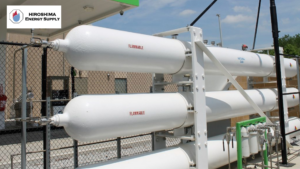DISTINGUISHING LPG, LNG AND CNG
Natural gas plays an indispensable role in life and industrial production. Among them, LPG, LNG and CNG are three popular types, often mentioned with their own applications and characteristics. However, many people still confuse these types of gas. This article will help you distinguish more clearly, thereby choosing the product that best suits your needs.
1. Concept and Components
LPG (Liquefied Petroleum Gas)
LPG is liquefied petroleum gas, consisting mainly of
propane and
butane. This is a by-product of oil refining and natural gas extraction. LPG is in a gaseous state under normal conditions, but is compressed under high pressure to liquefy, making it convenient for storage and transportation.

LNG (Liquefied Natural Gas)
LNG is liquefied natural gas, the main component is
methane (CH₄). Unlike LPG, LNG is cooled to -162°C to turn into a liquid, reducing its volume to 1/600 of its gaseous state, making it convenient for long-distance transportation.

Compressed Natural Gas (CNG)
CNG is compressed natural gas, which also contains methane but is not liquefied like LNG. Instead, CNG is compressed at high pressure (typically 200-250 bar) and stored in pressure vessels.

2. Outstanding Features
LPG
- Advantage:
- Easy to transport and store due to liquefaction under moderate pressure.
- High heat, suitable for use in industry, restaurants and households.
- Flexible applications: from fuel for gas stoves, vehicles, to industries.
- Disadvantages:
- The cost is usually higher than LNG and CNG.
- Dependent on oil supply, susceptible to price fluctuations.
LNG
- Advantage:
- Cleaner than LPG due to containing fewer impurities.
- High heat, suitable for large industries such as power generation, cement, and petrochemical.
- Safer in case of leakage because it is volatile and disperses quickly in the air.
- Disadvantages:
- Requires complex infrastructure to cool and maintain low temperatures.
- Difficult to use in small applications.
CNG
- Advantage:
- Low cost, environmentally friendly, less greenhouse gas emissions than LPG.
- Commonly used as fuel for buses, taxis, and public transportation.
- Disadvantages:
- Requires high pressure vessels, not easy to transport long distances like LPG or LNG.
- Lower heat output, less suitable for industries requiring large amounts of energy.
3. Practical Application
LPG
- Family: Is a popular fuel source for gas stoves and water heaters.
- Industrial: Used in ceramic production, food processing, or as fuel for forklifts.
- Commerce: Used in restaurants, hotels, or eateries.
LNG
- Electricity generation: Is the main fuel for gas-fired thermal power plants.
- Sea transport: Becoming a trend of clean fuel to replace diesel.
- Heavy industry: Suitable for cement, steel and chemical factories.
CNG
- Transportation: Replace gasoline for public transport, helping to reduce pollution.
- Light industry: Applications in boilers or small-scale heating.
- Agriculture: Used as fuel for modern agricultural machinery.
4. Overall Comparison
| Criteria |
LPG |
LNG |
CNG |
| Ingredient |
Propane, Butane |
Methane |
Methane |
| Storage status |
Liquefies at moderate pressure |
Liquefies at -162°C |
Compressed at high pressure |
| Heat |
High |
High |
Medium |
| Application |
Flexible |
Large industry |
Transportation |
| Infrastructure requirements |
Medium |
Complicated |
Medium |
| Environmental friendliness |
Medium |
High |
High |
5. Choose the Right Fuel
The choice between LPG, LNG or CNG depends on the intended use, available infrastructure and budget:
- LPG: Suitable for a wide range of applications, from home to industrial.
- LNG: Top choice for large industry or long distance transportation.
- CNG: Ideal for public transport or small retail applications where cost savings are needed.
HIROSHIMA ENERGY SUPPLY – THE TRUSTED CHOICE FOR LPG
Among the three types of gas above, LPG stands out for its versatility and convenience, especially when supplied by reputable units.
Hiroshima Energy Supply (HES) Proud to be a supplier of high quality LPG, ensuring:
- Absolutely safe thanks to products that meet international standards.
- Absolute peace of mind with regular inspection and maintenance procedures.
- Absolute comfort when using professional Japanese standard service.
Please contact
HES to get advice on the best LPG solution for your business and family! HIROSHIMA ENERGY SUPPLY - Providing "Safety, peace of mind, comfort" through LPG-related services, Japanese quality. 🌐Website: https://hiroshima-energysupply.com/ 🎥Youtube: https://www.youtube.com/@HiroshimaEnergySupply 📞Hotline: 0919316889-0829698125 📩Email: HES@hiroshima-energysupply.com 🏠Address: Dong Van I Industrial Park, Duy Tien Town, Ha Nam Province



Leave a comment